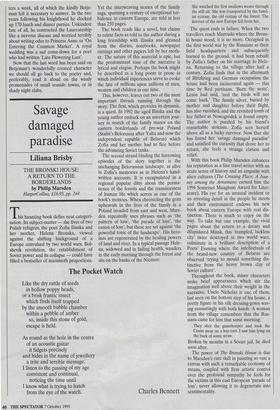Savage damaged paradise
Liliana Brisby
THE BRONSKI HOUSE: A RETURN TO THE BORDERLANDS by Philip Marsden HarperCollins, £16.95, pp. 244 This haunting book defies neat categori- sation. Its subject-matter — the lives of two Polish refugees, the poet Zofia Ilinska and her mother, Helena Bronska, viewed against the shifting background of a Europe convulsed by two world wars, Bol- shevik revolution, the establishment of Soviet power and its collapse — could have filled a bestseller of mammoth proportions. Yet the interweaving stories of the family saga, spanning a century of exceptional tur- bulence in eastern Europe, are told in less than 250 pages.
The book reads like a novel, but claims to relate facts as told to the author during a long friendship with Ilinska and gleaned from the diaries, notebooks, newspaper cuttings and other papers left by her moth- er. The nature of this material is epic, but the predominant tone of the narrative is lyrical and elegiac. Perhaps the book might be described as a long poem in prose in which individual experiences serve to evoke the fate of millions upon millions of men, women and children in our time.
This, however, leaves out two of the most important threads running through the story. The first, which provides its dynamic, is a quest. In 1992 the aged Ilinska and the young author embark on an uncertain jour- ney in search of the family manor on the eastern borderlands of pre-war Poland (Stalin's Belorussia after Yalta and now the independent republic of Belarus) which Zofia and her mother had to flee before the advancing Soviet tanks.
The second strand binding the harrowing episodes of the story together is the unchanging Belorussian landscape, as alive in Zofia's memories as in Helena's hand- written accounts. It is encapsulated in a regional popular ditty about the perma- nence of the forests and the transitoriness of human life which serves as one of the book's mottoes. When chronicling the grim upheavals in the lives of the family in a Poland invaded from east and west, Mars- den repeatedly uses phrases such as 'the pattern of loss', 'the parade of loss', 'the canon of loss', but these are set against 'the powerful tonic of the landscape'. His hero- ines are regenerated by the healing powers of land and river. In a typical passage Hele- na, widowed and in failing health, wanders in the early morning through the forest and sits on the banks of the Niemen: She watched the first swallows weave through the still air. She was transported by the famil- iar ecstasy, the old ecstasy of the forest. The horrors of the new Europe fell from her.
The quest ends in failure. When the two travellers reach Mantuski where the Brons- ki house stood, it is no more. Occupied in the first world war by the Russians as their field headquarters and subsequently burned to the ground, it had been rebuilt by Z,ofia's father on his marriage to Hele- na. Returning to the village after half a century, Zofia finds that in the aftermath of Blitzkrieg and German occupation the house had been incinerated again — this time by Red partisans. 'Burn the nests', Lenin had said, 'and the birds will not come back.' The family silver, buried by mother and daughter before their flight, has also vanished, and the revisited tomb of her father at Nowogrodek is found empty. The author is puzzled by his friend's remarkable stoicism. Zofia sees herself above all as a lucky survivor. Now that she has found her 'savage damaged paradise' and satisfied the curiosity that drove her to return, she feels a strange elation and relief.
With this book Philip Marsden enhances his reputation as a fine travel writer with an acute sense of history and an empathy with alien cultures (The Crossing Place: A Jour- ney among the Armenians earned him the 1994 Somerset Maugham Award for Liter- ature). His eye for an unusual incident or an arresting detail in the people he meets and their environment endows his new book about eastern Europe with real dis- tinction. There is much to enjoy on the way. To take but one example, the vivid pages about the return to a dreary and dilapidated Minsk, this 'trampled, luckless city' twice destroyed in two world wars, culminate in a brilliant description of a Poets' Evening where the intellectuals of the brand-new country of Belarus are observed 'trying to mould something dis- tinctive from the heavy brown clay of Soviet culture'.
Throughout the book, minor characters make brief appearances which stir the imagination well above their weight in the narrative. Uncle Nicholas is one of them, last seen on the bottom step of his house, a portly figure in his silk dressing-gown wav- ing reassuringly with both hands. A woman from the village remembers that the Rus- sians came for him that same morning:
They shot the gamekeeper and took the Count away on a hay-cart. I saw him lying on the back of some straw.
Broken by months in a Soviet jail, he died soon after.
The power of The Bronski House is due to Marsden's rare skill in painting so vast a canvas with such a remarkable economy of means, coupled with firm artistic control over the profound sympathy he feels for the victims in this east European 'parade of loss', never allowing it to degenerate into sentimentality.










































































 Previous page
Previous page